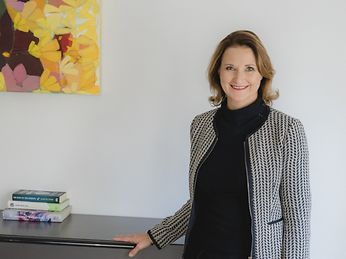25 Years ETF's: Interview series #2
25 Years ETF's: Interview series #2 Heike Fuerpass-Peter, Managing Director, MorgenFund
25 years ago, on April 11, 2000, Deutsche Börse made history: It was the first stock exchange in Europe to launch ETF trading. On the occasion of our anniversary, we look back at the experiences of some ETF pioneers.
How did you experience the introduction of ETFs in the early days?
I was fortunate enough to have my first contact with ETFs as early as 1999 at the beginning of my career at Merrill Lynch. ETFs were already widespread and successful in the US at that time. As an American firm, Merrill Lynch ventured across the Atlantic. Subsequently, I was actively involved in the introduction of the first two ETFs in Europe, the so-called LDRs, which were listed on Deutsche Börse in April 2000. The products tracked the EuroStoxx 50 and Stoxx 50 indices. It was a very exciting time, in which we helped build the market for ETFs, which were still unknown in Europe at the time.
How has the perception of ETFs changed over time – both among institutional and private investors?
In the early days, awareness of ETFs was very low, even among professional investors. They were largely perceived as a purely institutional product. A lot of educational work was necessary to communicate the advantages of this product. For private investors, the benefits of ETFs only became clear after several years, and it took some time before the broad market potential was tapped. Today, the picture is completely different: ETFs have arrived in the market.
What was your greatest success in connection with ETFs?
A particular success for me was my contribution to the spread of ETFs in the retail sector. As early as 2010, we at Lyxor concluded the first cooperations with online brokers - at that time also against internal resistance. I have always advocated that ETFs should also be made accessible to end customers, with the right partnerships, targeted marketing, and financial education initiatives. Today, Germany is the leading private investor market for ETFs in Europe. Inflows from private investors can now keep pace with those from institutional investors and sometimes even surpass them. In my view, ETFs are an ideal product for private investors because they are the only financial product that allows small investors to pay the same low management fees as institutional investors. This has contributed significantly to the democratization of investment and motivated many people to take a more active role in their retirement planning.
What tips would you give investors when putting together a portfolio for long-term wealth accumulation?
For long-term wealth accumulation, broad diversification across different asset classes is central. It is just as important to consider one's own risk tolerance and personal investment horizon. This is particularly crucial in the current market environment with sometimes high fluctuations. When selecting products, one should not only pay attention to the total expense ratio (TER), but also keep an eye on the actual performance of the ETFs. And very important: You should only invest in products that you really understand, and here with ETFs the index is relevant or, in the case of active ETFs, the investment strategy.
How do you see the future of ETFs in the next 25 years?
I still see enormous growth potential. As a fund platform, we are observing that more and more advisors are also opening up to ETFs and integrating them more strongly into their recommendations, in parallel with actively managed funds. Compared to other European countries, the private investor market outside of Germany still has significant catching up to do. ETFs have proven to be resilient in times of crisis over the past 25 years - thanks to their transparency, low costs, and high liquidity. I am convinced that they will continue to emerge stronger from market turbulence in the future. Trends such as digitalization, the growing influence of the next generation of investors, and the increasing importance of private investors will further drive ETFs.
